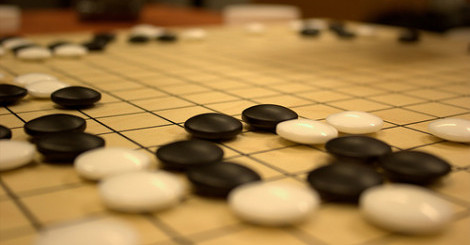
 )
)Almost 20 years after IBM’s Deep Blue defeated Garry Kasparov in chess, Google’s AlphaGo has proven superior at the game of Go. If you are unfamiliar with the relative complexity of the two games, know that each achievement employed cutting edge artificial intelligence research. Now consider how far computers have come in two decades in general; for reference, Google was still over a year away from being founded when the chess match took place. The primary challenge with Go is the astronomical number of possibilities; just calculating the number of legal Go board positions for a standard 19×19 game was an achievement in itself announced earlier this year. That number: roughly 2 x 10170. There are far fewer particles in all the universe (~1080), and even fewer legal chess positions (~1047).
Since there are so many possibilities in Go, it’s not possible to play all the games and find a winning sequence from any position, the way one can do with Tic Tac Toe. Consequently, humans and computers alike have to develop heuristics, or if you prefer, intuition; we need to guess the most likely directions the game will take based on previous experience and act accordingly. Of course, computers can still play many more games than humans which helps make their heuristics better. Still, a surprising move unlike anything seen in those prior games can still present a challenge. AlphaGo’s human opponent managed one victory doing the unexpected.
As it is Lent, the challenge of Go has me thinking about the problem of sin. God’s solution involved his incarnation and death in the person of Jesus. Presumably, this was the best of all possible solutions, since a suboptimal solution seems unworthy of God. How many possible solutions did God need to consider? One imagines there are many more ways to sin than there are Go boards. Or does God have perfect heuristics so that his intuition provides the best answer without the need to reflect on all the variations? Or does he know the answer because he made the rules? That’s a possibility, but perhaps not a guarantee; we invented the rules of Go after all.
Such questions can be stimulating, but even more intriguing to me is how counter-intuitive God’s solution is. No one expected the Messiah to die. No one expected the King of Kings to be coronated at his funeral. What comes naturally to us may not be part of God’s best plan for us. For AlphaGo, losing because of an unexpected move means going back and playing new games with new positions to improve its heuristics. Maybe God is calling us into new, uncharted scenarios to improve our intuition as well.
Andy has worn many hats in his life. He knows this is a dreadfully clichéd notion, but since it is also literally true he uses it anyway. Among his current metaphorical hats: husband of one wife, father of two teenagers, reader of science fiction and science fact, enthusiast of contemporary symphonic music, and chief science officer. Previous metaphorical hats include: comp bio postdoc, molecular biology grad student, InterVarsity chapter president (that one came with a literal hat), music store clerk, house painter, and mosquito trapper. Among his more unique literal hats: British bobby, captain’s hats (of varying levels of authenticity) of several specific vessels, a deerstalker from 221B Baker St, and a railroad engineer’s cap. His monthly Science in Review is drawn from his weekly Science Corner posts — Wednesdays, 8am (Eastern) on the Emerging Scholars Network Blog. His book Faith across the Multiverse is available from Hendrickson.

Leave a Reply